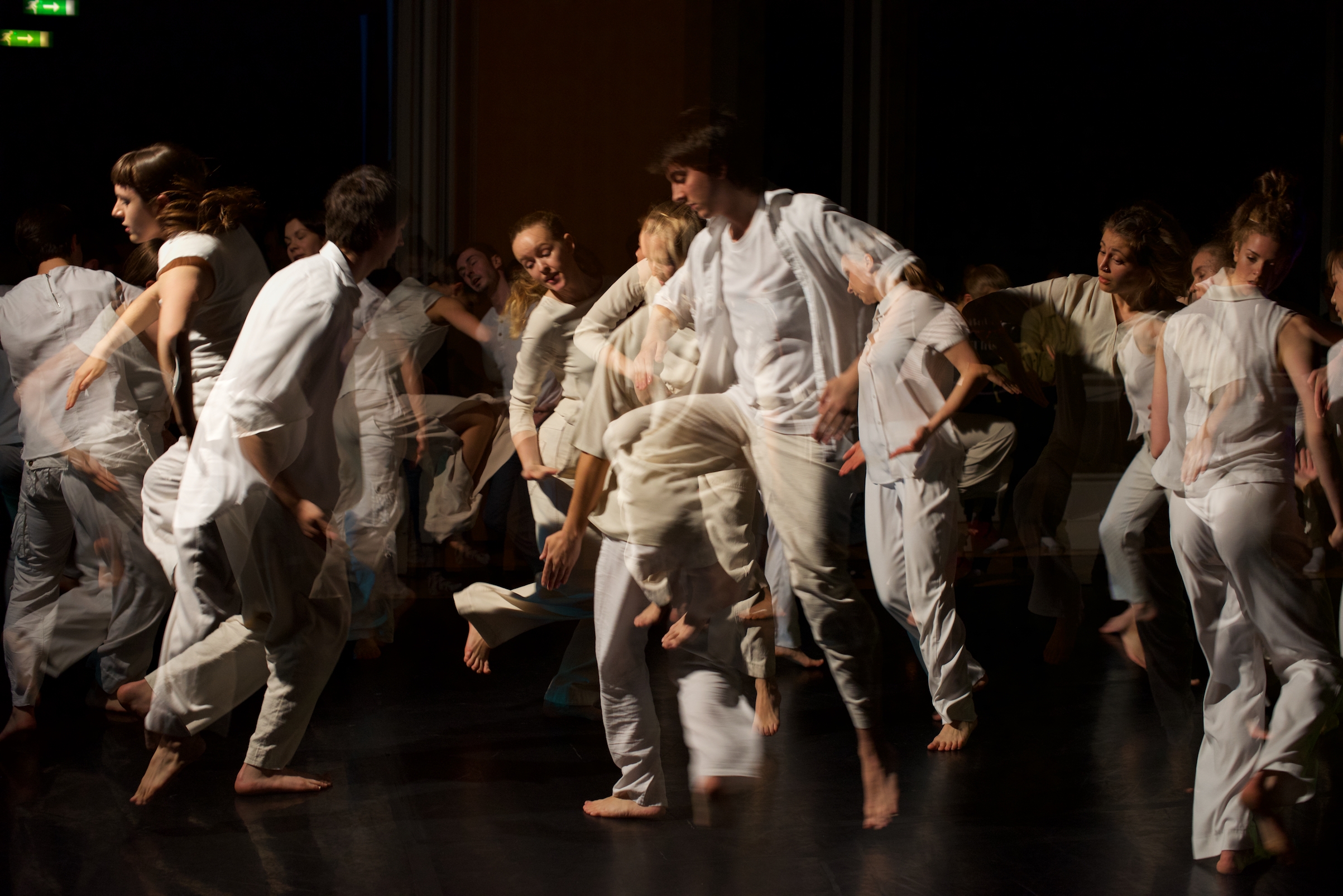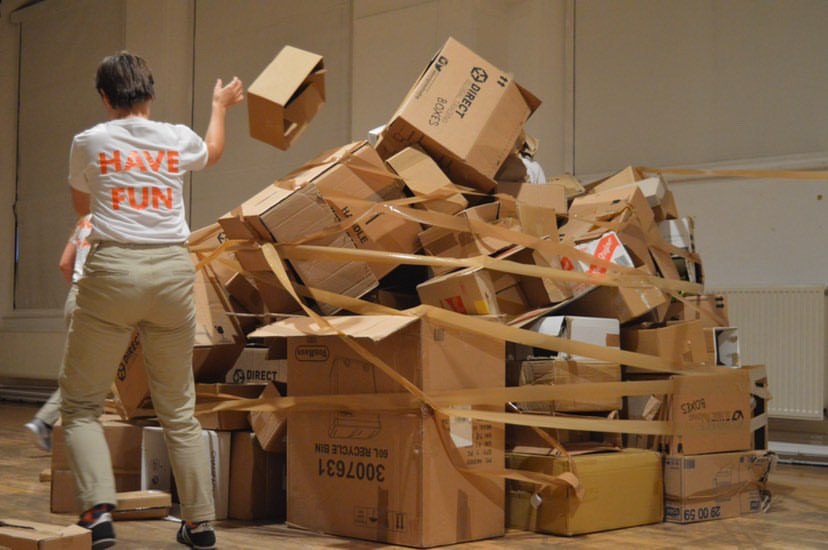Words by Katie Hagan.
In hard, lamentable times nothing speaks what cannot be spoken like immersive art with an affective concept.
We’re existing in a world where senseless amounts of waste is clogging up our green spaces and oceans. I, a citizen of the western world, live in a society which looks on indifferently through phones and laptop screens as Hong Kong’s identity is threatened with displacement. What will it take for people to be engaged?
To be awakened to what is going on?
The collaborative, immersive dance works I watched at the London Contemporary Dance School’s sharing evening at The Place – ‘1 Click Away’ by dance artist Greta Gauhe and ‘Meniscus’ by duo Ghost and John – are probably two of a handful of performances which have affected me so patently.
‘1 Click Away’ begins with four female dancers standing in a line across the stage, rhythmically and ritualistically passing used cardboard boxes to each other. It is manual. It is physically exhausting. They are sweating. Most bodies working for the world’s biggest delivery companies are exploited like this day in, day out.
Clad in high-vis vests and white t-shirts with the ironic slogans ‘Make History’ and ‘Have Fun’ branded on the rear, the women pass all the boxes from one side of the room to create a structure, only to destroy the edifice and then start the box-passing process again from the other side of the space.
Whilst it might seem pretty odd to repeat it, Gauhe’s beautiful use of nuance lifts the repetition to another level. From the new side, dancers create rhythms and change speeds as they pass the boxes, cutting the repetition with a marvellous tension, which is unleashed when the dancers carefully construct a box-jenga that nearly reaches the ceiling. Even the faintest breath would make it tumble.
The dancers invite audience members to help them create an even larger cardboard box monument to overwhelm the performance space. We retreat back comfortably to our childlike disposition to find story in inanimate waste.
Gauhe’s piece is a manifestation of a box: it is multi-dimensional, multi-layered and wrapped in paradox. It viscerally exposes the damaging environmental effects of waste, yet in the same breath draws attention to the many people who rely on logistics/delivery jobs to put food on the table. And in another perhaps more innocent way the piece is simply about playing with boxes.
The lasting message which I took away was the unexpected delight in realising the things we take for granted and use everyday can still make us smile. ‘1 Click Away’ lies on a continuum between play and more sinister ideas such as exploitation, not to mention its ability to demonstrate how we can find beauty in the things we chuck away.

Ghost and John’s ‘Meniscus’ transports us to a clinical social underworld of dancers dressed in white. We have to download an app and be part of a group chat to enter the black hole-like space. It is a clever way to engage us by drawing us in with what we – especially Generation Z-ers *sigh* – are distracted by: Technology with a capital T.
After entering the space in separate groups, we are each led by a ‘cool with a touch of ice’ tour guide, who informs us to scan the dancers’ bar-codes (imprinted on different body parts) to identify their backgrounds. The mood is futuristic, a little like Willy Wonka’s Television Room crossed with a planetarium.
As we are taken around the space, we are fed with stories about menstruation, invited to read uncensored, underground Hong Kong literature, and asked to look at bowls planted on the floor filled with water. But as much as we are politely entreated to immerse ourselves, the environment makes us feel as if we can’t. It feels like it might fracture any second.
Four ballet dancers continuing the white, don’t touch me theme, start moving, eating raspberry red ice cream as they teeter around. The other dancers who were previously tour guides shed their form; one plays lightly with toilet roll, and others carry the bowls of water ceremoniously. There’s been disruption.
The dancers then break out into a group piece; the choreography is pulsing, combative without aggression, and energetic. One person dances alone on a bench. A Judas, she is ostracised and is challenged underneath a spotlight for abandoning the group.
At the end, and after being lost in a kaleidoscopic mirror installation, we are invited to vibe with one another and celebrate something. It isn’t clear what and I stand a little awkwardly not feeling like I should move, even when I have been invited to. We are asked to take selfies and share information in the group chat. I don’t know how to behave and I’m really made aware of my body in the space, however others are dancing and celebrating this newfound liberation.
‘Meniscus’ definitely poses questions about what it means to be censored. It also expresses how technology is both a hindrance and an enhancer of social interaction. And it felt right to ask these questions in an immersive space. Participants could get close to the ideas ‘Meniscus’ roused simply because we were shoulder-to-shoulder with the performing bodies embodying these ideas.
A fire pit of cross-continental collaborative energy, with composers, dancers, videographers and illustrators involved, ‘Meniscus’ is a provocative production which hits you in places a proscenium arch theatre cannot. But it also left me feeling quite uncomfortable not knowing what I’d experienced, and realising that I would never return to the place I’d just emerged from ever again in my life. All I had left was the app I’d downloaded onto my phone. I haven’t deleted it yet.
Header Image: Greta Gauhe.
